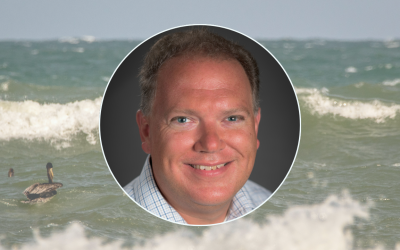As destinations watch global tourism visitation continue to grow, some are asking: How many visitors are too many, and how can we influence who will visit?
In an effort to manage and avoid the tide of mass tourism beginning to affect some parts of the world (see Bye Bye Barcelona), the Caribbean region has made sustainable tourism a priority in coordination with its 28 member nations. This means striking a balance that will bring value to both the visitors and residents of today, and tomorrow’s citizens of the world.
Secretary General and Chief Executive Officer of the Caribbean Tourism Organization (CTO) Hugh Riley spoke as a panelist during our Profit and Planet session at Destination Think Forum 2016 in New York City. In this two-part interview, Hugh describes the CTO’s approach to managing sustainable tourism from an environmental, economic and resident perspective.

Hugh Riley, centre, spoke as a panelist at Destination Think Forum 2016.
Destination Think: Why is balancing economic, resident and environmental needs important to the Caribbean Tourism Organization?
Hugh Riley: It’s important because the Caribbean is the most tourism-dependent region in the world. Our citizens understand very clearly that their livelihood depends upon the success of the tourism industry.
What you also want to be sure of, though, is that there are always systems and standards and regulations in place to ensure the enjoyment of this asset for everyone. Keeping the balance is making sure, therefore, that we don’t destroy the asset, because it has to be around for our children and grandchildren and their grandchildren. But we also have to make sure that we get the maximum economic benefit from it today. That is really where the trick comes – keeping that right balance.
What are the biggest challenges the CTO faces as it develops sustainable tourism?
One of the biggest challenges we face in the tourism sector is the competition. Because tourism is such a massively powerful tool for economic development, everyone has adopted it. Virtually every country in the world has recognized the value of tourism, including developed countries with powerful budgets and massive resources. The United States is in the tourism business, big time. And let me qualify that. We’re not just talking about the cities, the states and the attractions. The country itself has formed a Brand USA campaign to tell people overseas that America is in the tourism business.
So when we consider what the competition is, and when we consider that we are the most tourism-dependent region, our biggest challenge is to make sure we can not just maintain but somehow grow our piece of that very attractive pie that big players are going after.

Hugh Riley, Secretary General and CEO, Caribbean Tourism Organization
We must also make sure that the measurements are in place for us to do two things: First, to understand what the value of a plane load that comes to the Caribbean truly is and second, to keep that balance between numbers and actual quality. At the end of the day, what you want is profitability. You can’t only be focused on numbers, because as the old cliché says, you can’t lose $5 on every sale and make it up on volume. So you might very well be paying a disproportionate amount of attention on growing volume, and not looking at quality and not looking at profitability, because we have a finite amount of space.
How do you try and maintain that balance between quality and profitability?
One thing we are very focused on throughout the Caribbean is this business of diversifying our market segments, both geographically and in terms of niches, because we are known to be a fabulous warm weather destination. People certainly come from temperate countries in the winter, when the Caribbean becomes extremely desirable and people want to go to the beach, and so on.
There’s nothing wrong with the “fly and flop” visitors, because there are people who see the Caribbean that way. They live very stressful lives, they’ve got very short amounts of time for a vacation, and that’s all they can do.
But we also want people to come for the food, and the culture, and the history, and the topography, and the music, and the art and all those other elements, and to the extent that you can start attracting more experienced, more sophisticated, more monied travellers, then you are also satisfying some other important goals.
Since diversification is important, how do you address visitor numbers? For example, how do you define your destination’s maximum carrying capacity?
By making very tough policy decisions at the national level. And the Caribbean Tourism Organization is in an advisory role. We don’t set national policy for any of our member countries, of course. But there needs to be tough decision making. At some point, countries around the world, the Caribbean included, make decisions about the number of cruise lines they’re going to accept, the size of the cruise ships that are going to come into the port, the sources of business to prospect, questions of charter vs. scheduled aircraft; and upscale vs. midscale travellers.
Those are very tough decisions that have to be made. But you have to make those decisions, because that’s what carrying capacity is all about. If your capacity is a particular number, you want to make sure that that number is a profitable number and a profitable type of visitor. And that is really the essence of that kind of policy that has to be made.
Gain more valuable insights from speakers, panelists and participants from Destination Think Forum, where the world’s leading destination marketers gathered to address their greatest challenges. Read more interviews with Forum’s Leading Thinkers.










0 Comments